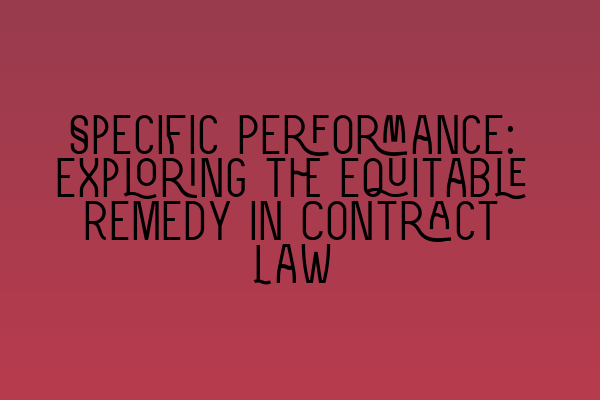Specific Performance: Exploring the Equitable Remedy in Contract Law
Introduction:
In the world of contract law, disputes are not uncommon. Sometimes, monetary damages just don’t cut it, and parties seek alternative remedies to enforce contractual obligations. One such remedy is specific performance, a powerful equitable remedy that aims to compel the breaching party to fulfill their obligations as stated in the contract.
In this blog post, we will dive deeper into the concept of specific performance, exploring its foundations, requirements, and limitations. Join us on this journey as we unravel the intricacies of this fascinating equitable remedy.
Understanding Specific Performance:
Specific performance is a court-ordered remedy that compels a party to perform its contractual obligations according to the precise terms specified in the contract. Unlike monetary damages, which aim to compensate for losses suffered as a result of the breach, specific performance seeks to enforce the actual contractual promise.
Key Requirements:
To obtain specific performance, certain requirements must be met by the party seeking this remedy. Let’s take a closer look at what these requirements typically entail:
1. Valid and Enforceable Contract: First and foremost, there must be a valid and enforceable contract between the parties. This includes clarity and certainty regarding the terms and conditions of the agreement, as well as mutual assent and consideration.
2. Unique Subject Matter: Specific performance is generally reserved for contracts involving unique subject matter, such as real property, rare goods, or services that are difficult to replace. It is typically not available for contracts involving standard or readily available items.
3. No Adequate Legal Remedy: The party seeking specific performance must demonstrate that monetary damages would be insufficient to compensate for the breach. This often arises when the subject matter is of great value or has sentimental significance.
4. Feasibility: The court must determine whether specific performance is feasible and practical, taking into consideration factors such as the inherent difficulty in enforcing the remedy or potential harm caused to the breaching party.
Limitations and Discretion:
While specific performance is a powerful remedy, it is not always available or granted by the court. There are certain limitations and discretionary factors involved, including:
1. Personal Services Contracts: Specific performance is generally not available for contracts requiring personal services, as it would amount to involuntary servitude. Instead, courts typically opt for monetary damages in such cases.
2. Inadequate Performance: If the party seeking specific performance has not fulfilled their own obligations under the contract or has acted in bad faith, the court may deny the remedy, as it would be inequitable to enforce obligations upon one party without the other fulfilling their own.
3. Hardship and Unconscionability: Specific performance may be denied if enforcing the contract would result in undue hardship or unconscionable circumstances for the breaching party. The court will consider factors such as economic hardship, impracticality, and unfairness.
Utilizing Specific Performance:
For parties seeking to enforce contractual obligations, specific performance can be a valuable tool. However, it is crucial to understand the limitations and considerations involved. Consulting with a contract law expert or solicitor can provide guidance and support throughout the process.
Conclusion:
Specific performance is an equitable remedy that plays a significant role in the world of contract law. It allows parties to seek enforcement of their contractual obligations when monetary damages fall short. By understanding the requirements, limitations, and discretionary factors involved, individuals can navigate the complex landscape of specific performance with confidence.
Remember, contract disputes can be tricky, and seeking professional advice is always recommended when pursuing specific performance or any other legal remedies.
